BUS708 Case Study: Benefits and Drawbacks of the TTIP Agreement
VerifiedAdded on 2023/05/28
|12
|3591
|318
Case Study
AI Summary
This case study examines the Transatlantic Trade and Investment Partnership (TTIP), a proposed free trade agreement between the United States and the European Union. The analysis highlights the potential benefits of TTIP, including improved purchasing power through economic growth, job creation, cheaper products, and lower production costs for companies. It also discusses how TTIP could create more opportunities for small and medium-sized enterprises and new businesses. The study also addresses potential disadvantages, such as job losses in certain sectors and concerns about lowering standards in areas like the environment and labor conditions. The case study also explores the reasons behind the perceived lack of opposition to TTIP compared to previous trade agreements, such as NAFTA. The overall focus is on providing a comprehensive overview of the potential impact of the TTIP on various stakeholders and the economy.

CASE STUDY 1
BUS708 Case Study: Creating the World’s Biggest Free Trade Zone
by Student’s name
Course code+name
Professor’s name
University name
City, State
Date of submission
BUS708 Case Study: Creating the World’s Biggest Free Trade Zone
by Student’s name
Course code+name
Professor’s name
University name
City, State
Date of submission
Paraphrase This Document
Need a fresh take? Get an instant paraphrase of this document with our AI Paraphraser
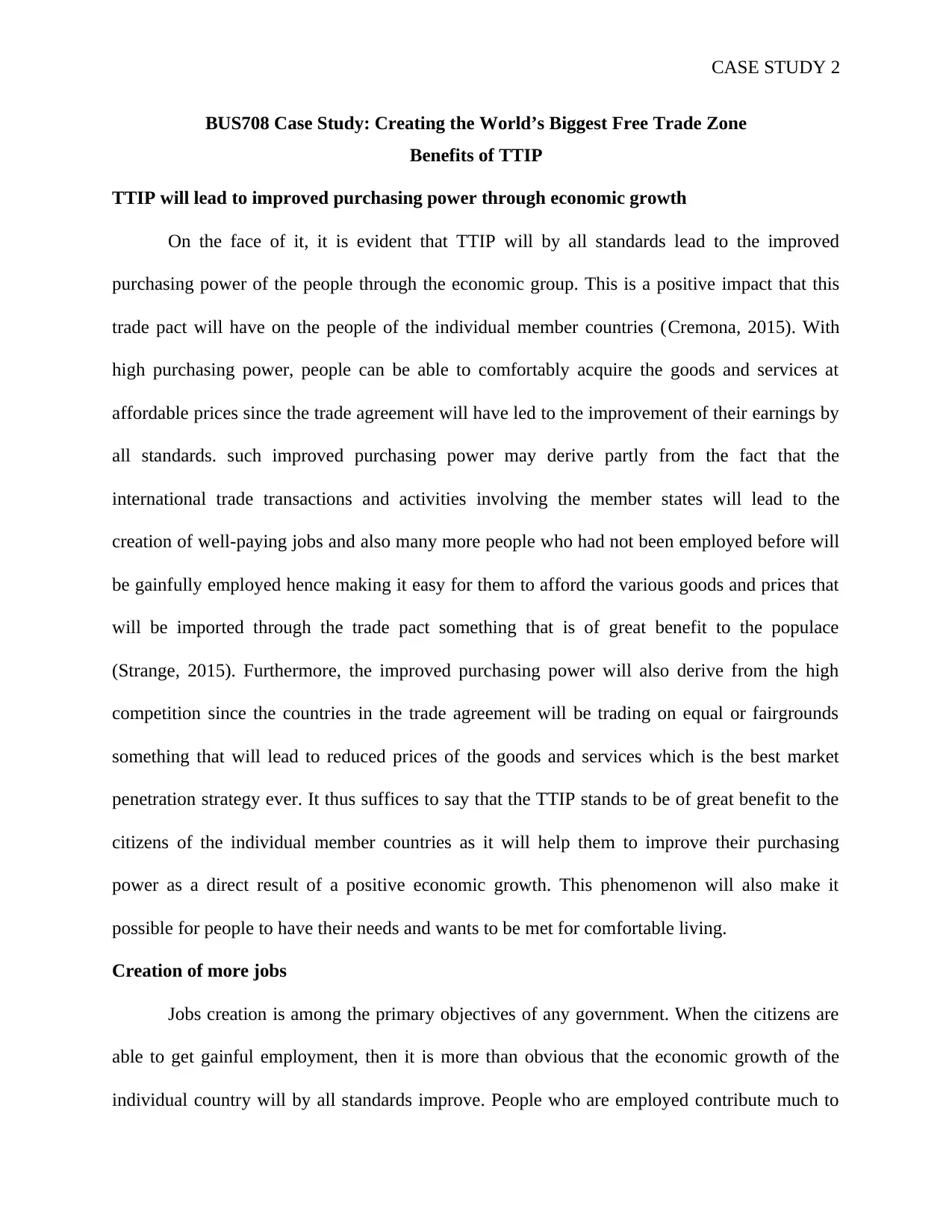
CASE STUDY 2
BUS708 Case Study: Creating the World’s Biggest Free Trade Zone
Benefits of TTIP
TTIP will lead to improved purchasing power through economic growth
On the face of it, it is evident that TTIP will by all standards lead to the improved
purchasing power of the people through the economic group. This is a positive impact that this
trade pact will have on the people of the individual member countries (Cremona, 2015). With
high purchasing power, people can be able to comfortably acquire the goods and services at
affordable prices since the trade agreement will have led to the improvement of their earnings by
all standards. such improved purchasing power may derive partly from the fact that the
international trade transactions and activities involving the member states will lead to the
creation of well-paying jobs and also many more people who had not been employed before will
be gainfully employed hence making it easy for them to afford the various goods and prices that
will be imported through the trade pact something that is of great benefit to the populace
(Strange, 2015). Furthermore, the improved purchasing power will also derive from the high
competition since the countries in the trade agreement will be trading on equal or fairgrounds
something that will lead to reduced prices of the goods and services which is the best market
penetration strategy ever. It thus suffices to say that the TTIP stands to be of great benefit to the
citizens of the individual member countries as it will help them to improve their purchasing
power as a direct result of a positive economic growth. This phenomenon will also make it
possible for people to have their needs and wants to be met for comfortable living.
Creation of more jobs
Jobs creation is among the primary objectives of any government. When the citizens are
able to get gainful employment, then it is more than obvious that the economic growth of the
individual country will by all standards improve. People who are employed contribute much to
BUS708 Case Study: Creating the World’s Biggest Free Trade Zone
Benefits of TTIP
TTIP will lead to improved purchasing power through economic growth
On the face of it, it is evident that TTIP will by all standards lead to the improved
purchasing power of the people through the economic group. This is a positive impact that this
trade pact will have on the people of the individual member countries (Cremona, 2015). With
high purchasing power, people can be able to comfortably acquire the goods and services at
affordable prices since the trade agreement will have led to the improvement of their earnings by
all standards. such improved purchasing power may derive partly from the fact that the
international trade transactions and activities involving the member states will lead to the
creation of well-paying jobs and also many more people who had not been employed before will
be gainfully employed hence making it easy for them to afford the various goods and prices that
will be imported through the trade pact something that is of great benefit to the populace
(Strange, 2015). Furthermore, the improved purchasing power will also derive from the high
competition since the countries in the trade agreement will be trading on equal or fairgrounds
something that will lead to reduced prices of the goods and services which is the best market
penetration strategy ever. It thus suffices to say that the TTIP stands to be of great benefit to the
citizens of the individual member countries as it will help them to improve their purchasing
power as a direct result of a positive economic growth. This phenomenon will also make it
possible for people to have their needs and wants to be met for comfortable living.
Creation of more jobs
Jobs creation is among the primary objectives of any government. When the citizens are
able to get gainful employment, then it is more than obvious that the economic growth of the
individual country will by all standards improve. People who are employed contribute much to
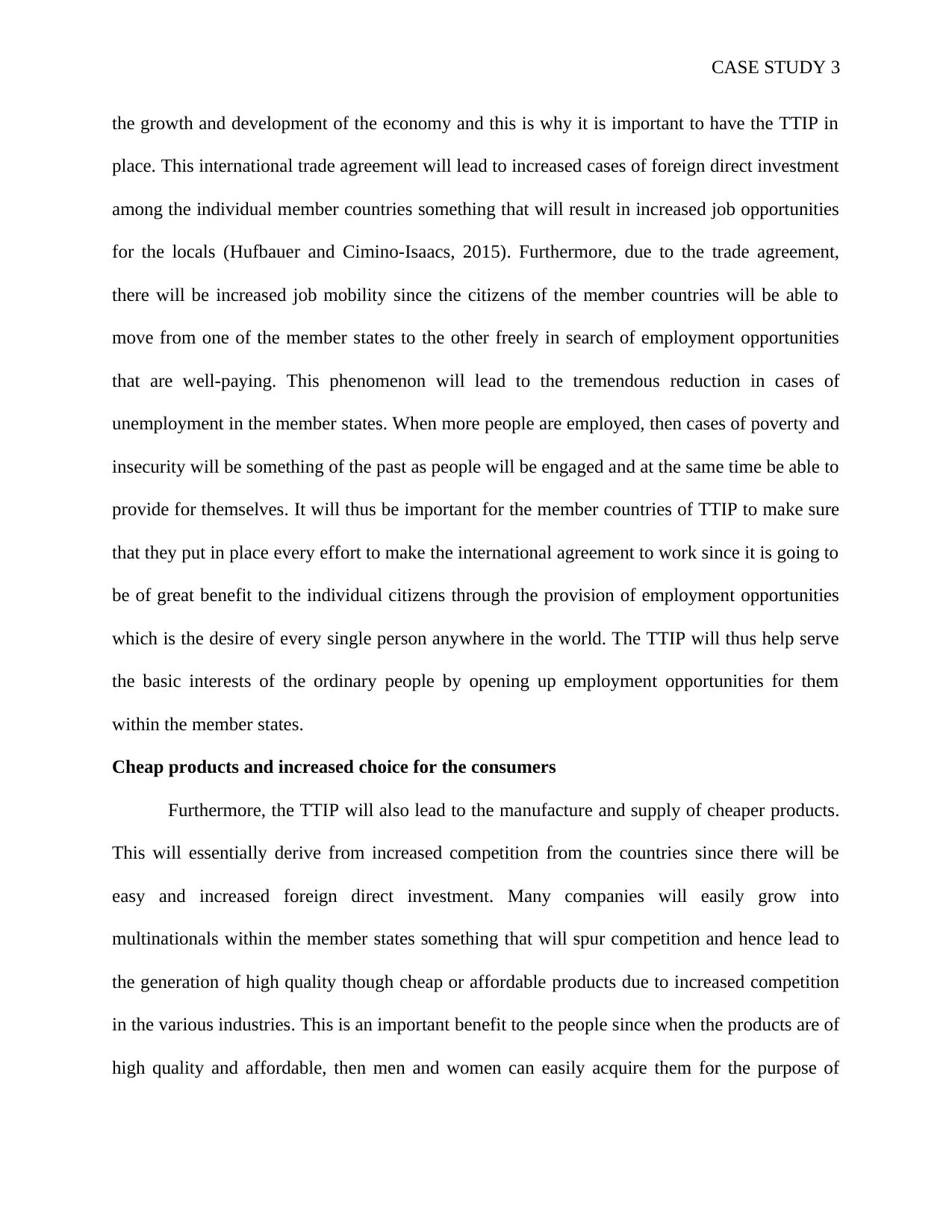
CASE STUDY 3
the growth and development of the economy and this is why it is important to have the TTIP in
place. This international trade agreement will lead to increased cases of foreign direct investment
among the individual member countries something that will result in increased job opportunities
for the locals (Hufbauer and Cimino-Isaacs, 2015). Furthermore, due to the trade agreement,
there will be increased job mobility since the citizens of the member countries will be able to
move from one of the member states to the other freely in search of employment opportunities
that are well-paying. This phenomenon will lead to the tremendous reduction in cases of
unemployment in the member states. When more people are employed, then cases of poverty and
insecurity will be something of the past as people will be engaged and at the same time be able to
provide for themselves. It will thus be important for the member countries of TTIP to make sure
that they put in place every effort to make the international agreement to work since it is going to
be of great benefit to the individual citizens through the provision of employment opportunities
which is the desire of every single person anywhere in the world. The TTIP will thus help serve
the basic interests of the ordinary people by opening up employment opportunities for them
within the member states.
Cheap products and increased choice for the consumers
Furthermore, the TTIP will also lead to the manufacture and supply of cheaper products.
This will essentially derive from increased competition from the countries since there will be
easy and increased foreign direct investment. Many companies will easily grow into
multinationals within the member states something that will spur competition and hence lead to
the generation of high quality though cheap or affordable products due to increased competition
in the various industries. This is an important benefit to the people since when the products are of
high quality and affordable, then men and women can easily acquire them for the purpose of
the growth and development of the economy and this is why it is important to have the TTIP in
place. This international trade agreement will lead to increased cases of foreign direct investment
among the individual member countries something that will result in increased job opportunities
for the locals (Hufbauer and Cimino-Isaacs, 2015). Furthermore, due to the trade agreement,
there will be increased job mobility since the citizens of the member countries will be able to
move from one of the member states to the other freely in search of employment opportunities
that are well-paying. This phenomenon will lead to the tremendous reduction in cases of
unemployment in the member states. When more people are employed, then cases of poverty and
insecurity will be something of the past as people will be engaged and at the same time be able to
provide for themselves. It will thus be important for the member countries of TTIP to make sure
that they put in place every effort to make the international agreement to work since it is going to
be of great benefit to the individual citizens through the provision of employment opportunities
which is the desire of every single person anywhere in the world. The TTIP will thus help serve
the basic interests of the ordinary people by opening up employment opportunities for them
within the member states.
Cheap products and increased choice for the consumers
Furthermore, the TTIP will also lead to the manufacture and supply of cheaper products.
This will essentially derive from increased competition from the countries since there will be
easy and increased foreign direct investment. Many companies will easily grow into
multinationals within the member states something that will spur competition and hence lead to
the generation of high quality though cheap or affordable products due to increased competition
in the various industries. This is an important benefit to the people since when the products are of
high quality and affordable, then men and women can easily acquire them for the purpose of
⊘ This is a preview!⊘
Do you want full access?
Subscribe today to unlock all pages.

Trusted by 1+ million students worldwide
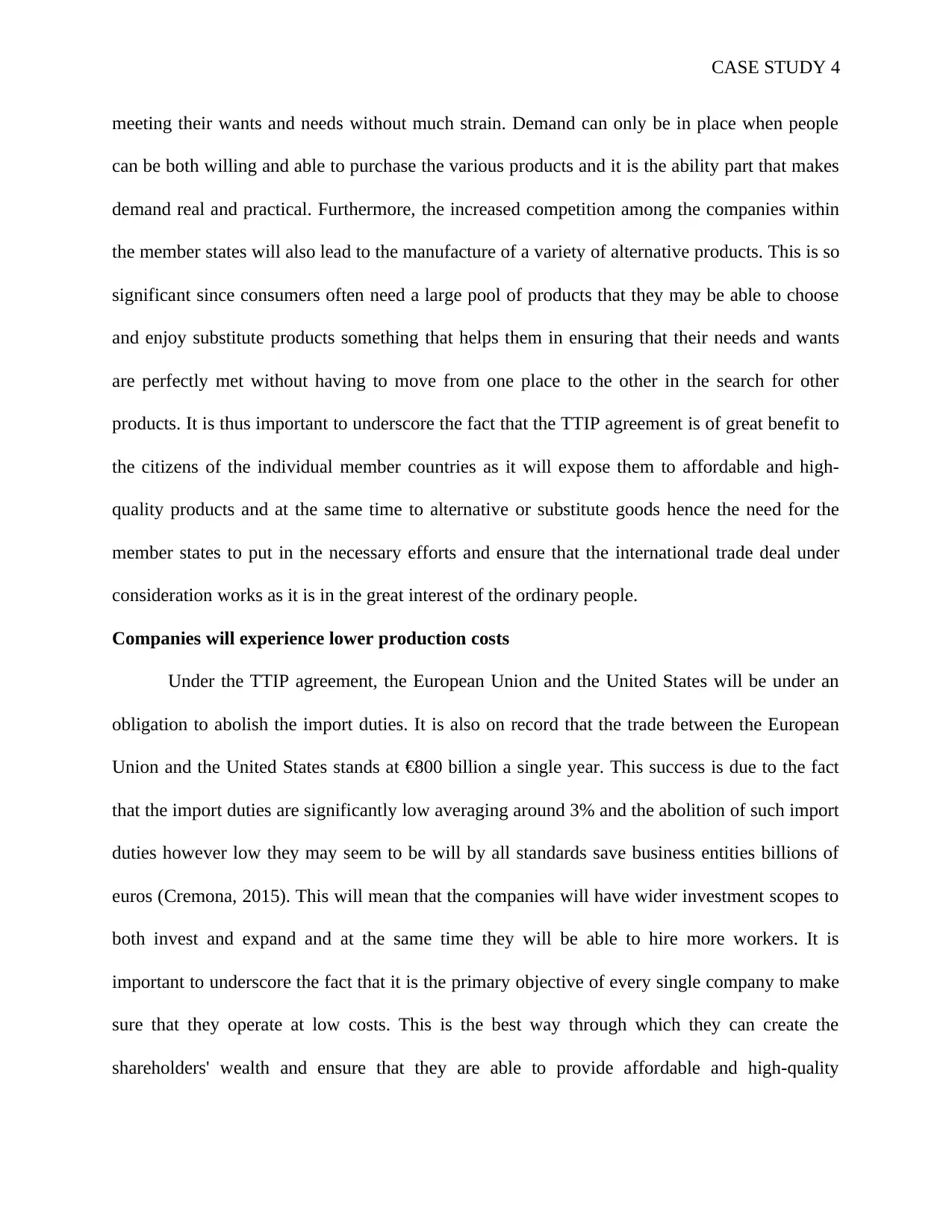
CASE STUDY 4
meeting their wants and needs without much strain. Demand can only be in place when people
can be both willing and able to purchase the various products and it is the ability part that makes
demand real and practical. Furthermore, the increased competition among the companies within
the member states will also lead to the manufacture of a variety of alternative products. This is so
significant since consumers often need a large pool of products that they may be able to choose
and enjoy substitute products something that helps them in ensuring that their needs and wants
are perfectly met without having to move from one place to the other in the search for other
products. It is thus important to underscore the fact that the TTIP agreement is of great benefit to
the citizens of the individual member countries as it will expose them to affordable and high-
quality products and at the same time to alternative or substitute goods hence the need for the
member states to put in the necessary efforts and ensure that the international trade deal under
consideration works as it is in the great interest of the ordinary people.
Companies will experience lower production costs
Under the TTIP agreement, the European Union and the United States will be under an
obligation to abolish the import duties. It is also on record that the trade between the European
Union and the United States stands at €800 billion a single year. This success is due to the fact
that the import duties are significantly low averaging around 3% and the abolition of such import
duties however low they may seem to be will by all standards save business entities billions of
euros (Cremona, 2015). This will mean that the companies will have wider investment scopes to
both invest and expand and at the same time they will be able to hire more workers. It is
important to underscore the fact that it is the primary objective of every single company to make
sure that they operate at low costs. This is the best way through which they can create the
shareholders' wealth and ensure that they are able to provide affordable and high-quality
meeting their wants and needs without much strain. Demand can only be in place when people
can be both willing and able to purchase the various products and it is the ability part that makes
demand real and practical. Furthermore, the increased competition among the companies within
the member states will also lead to the manufacture of a variety of alternative products. This is so
significant since consumers often need a large pool of products that they may be able to choose
and enjoy substitute products something that helps them in ensuring that their needs and wants
are perfectly met without having to move from one place to the other in the search for other
products. It is thus important to underscore the fact that the TTIP agreement is of great benefit to
the citizens of the individual member countries as it will expose them to affordable and high-
quality products and at the same time to alternative or substitute goods hence the need for the
member states to put in the necessary efforts and ensure that the international trade deal under
consideration works as it is in the great interest of the ordinary people.
Companies will experience lower production costs
Under the TTIP agreement, the European Union and the United States will be under an
obligation to abolish the import duties. It is also on record that the trade between the European
Union and the United States stands at €800 billion a single year. This success is due to the fact
that the import duties are significantly low averaging around 3% and the abolition of such import
duties however low they may seem to be will by all standards save business entities billions of
euros (Cremona, 2015). This will mean that the companies will have wider investment scopes to
both invest and expand and at the same time they will be able to hire more workers. It is
important to underscore the fact that it is the primary objective of every single company to make
sure that they operate at low costs. This is the best way through which they can create the
shareholders' wealth and ensure that they are able to provide affordable and high-quality
Paraphrase This Document
Need a fresh take? Get an instant paraphrase of this document with our AI Paraphraser
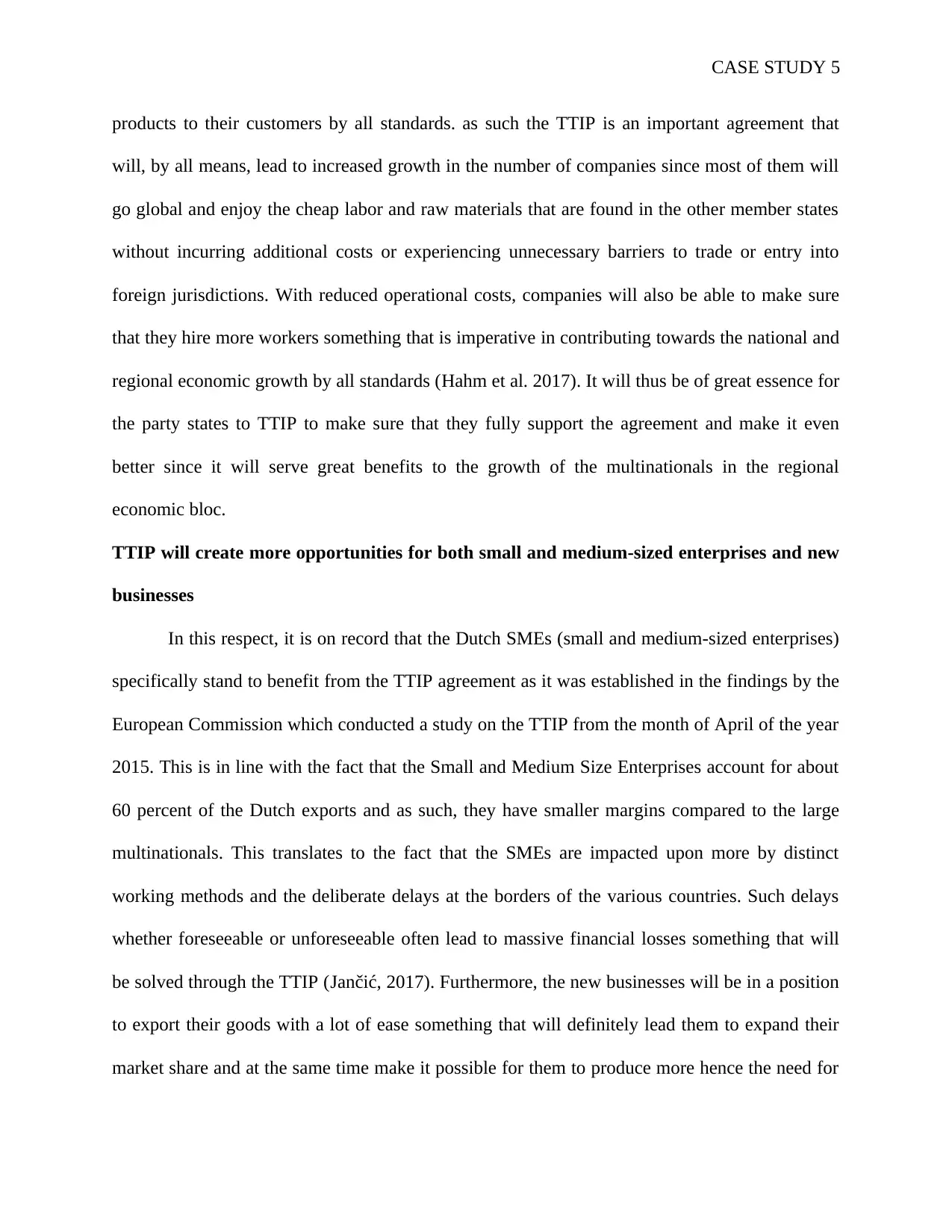
CASE STUDY 5
products to their customers by all standards. as such the TTIP is an important agreement that
will, by all means, lead to increased growth in the number of companies since most of them will
go global and enjoy the cheap labor and raw materials that are found in the other member states
without incurring additional costs or experiencing unnecessary barriers to trade or entry into
foreign jurisdictions. With reduced operational costs, companies will also be able to make sure
that they hire more workers something that is imperative in contributing towards the national and
regional economic growth by all standards (Hahm et al. 2017). It will thus be of great essence for
the party states to TTIP to make sure that they fully support the agreement and make it even
better since it will serve great benefits to the growth of the multinationals in the regional
economic bloc.
TTIP will create more opportunities for both small and medium-sized enterprises and new
businesses
In this respect, it is on record that the Dutch SMEs (small and medium-sized enterprises)
specifically stand to benefit from the TTIP agreement as it was established in the findings by the
European Commission which conducted a study on the TTIP from the month of April of the year
2015. This is in line with the fact that the Small and Medium Size Enterprises account for about
60 percent of the Dutch exports and as such, they have smaller margins compared to the large
multinationals. This translates to the fact that the SMEs are impacted upon more by distinct
working methods and the deliberate delays at the borders of the various countries. Such delays
whether foreseeable or unforeseeable often lead to massive financial losses something that will
be solved through the TTIP (Jančić, 2017). Furthermore, the new businesses will be in a position
to export their goods with a lot of ease something that will definitely lead them to expand their
market share and at the same time make it possible for them to produce more hence the need for
products to their customers by all standards. as such the TTIP is an important agreement that
will, by all means, lead to increased growth in the number of companies since most of them will
go global and enjoy the cheap labor and raw materials that are found in the other member states
without incurring additional costs or experiencing unnecessary barriers to trade or entry into
foreign jurisdictions. With reduced operational costs, companies will also be able to make sure
that they hire more workers something that is imperative in contributing towards the national and
regional economic growth by all standards (Hahm et al. 2017). It will thus be of great essence for
the party states to TTIP to make sure that they fully support the agreement and make it even
better since it will serve great benefits to the growth of the multinationals in the regional
economic bloc.
TTIP will create more opportunities for both small and medium-sized enterprises and new
businesses
In this respect, it is on record that the Dutch SMEs (small and medium-sized enterprises)
specifically stand to benefit from the TTIP agreement as it was established in the findings by the
European Commission which conducted a study on the TTIP from the month of April of the year
2015. This is in line with the fact that the Small and Medium Size Enterprises account for about
60 percent of the Dutch exports and as such, they have smaller margins compared to the large
multinationals. This translates to the fact that the SMEs are impacted upon more by distinct
working methods and the deliberate delays at the borders of the various countries. Such delays
whether foreseeable or unforeseeable often lead to massive financial losses something that will
be solved through the TTIP (Jančić, 2017). Furthermore, the new businesses will be in a position
to export their goods with a lot of ease something that will definitely lead them to expand their
market share and at the same time make it possible for them to produce more hence the need for
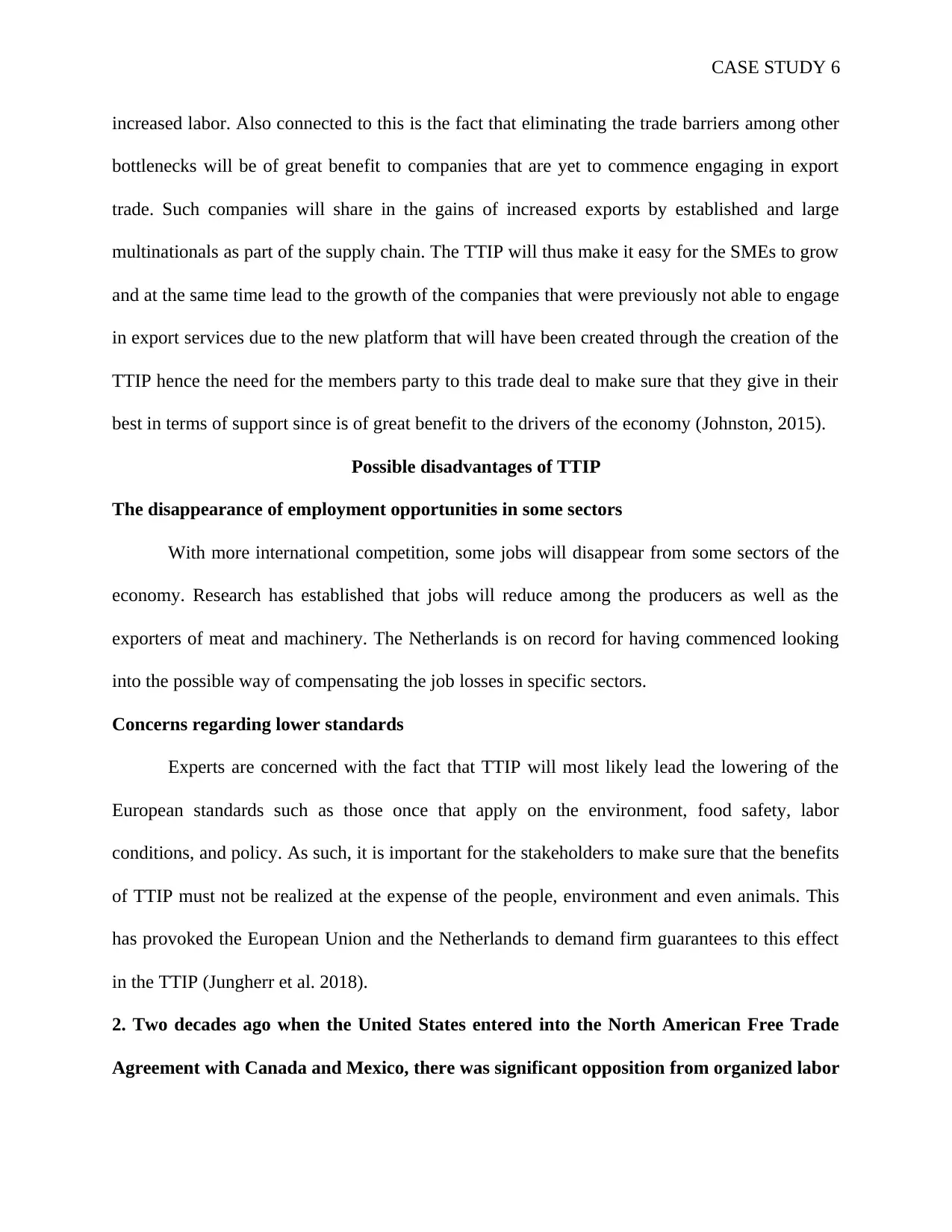
CASE STUDY 6
increased labor. Also connected to this is the fact that eliminating the trade barriers among other
bottlenecks will be of great benefit to companies that are yet to commence engaging in export
trade. Such companies will share in the gains of increased exports by established and large
multinationals as part of the supply chain. The TTIP will thus make it easy for the SMEs to grow
and at the same time lead to the growth of the companies that were previously not able to engage
in export services due to the new platform that will have been created through the creation of the
TTIP hence the need for the members party to this trade deal to make sure that they give in their
best in terms of support since is of great benefit to the drivers of the economy (Johnston, 2015).
Possible disadvantages of TTIP
The disappearance of employment opportunities in some sectors
With more international competition, some jobs will disappear from some sectors of the
economy. Research has established that jobs will reduce among the producers as well as the
exporters of meat and machinery. The Netherlands is on record for having commenced looking
into the possible way of compensating the job losses in specific sectors.
Concerns regarding lower standards
Experts are concerned with the fact that TTIP will most likely lead the lowering of the
European standards such as those once that apply on the environment, food safety, labor
conditions, and policy. As such, it is important for the stakeholders to make sure that the benefits
of TTIP must not be realized at the expense of the people, environment and even animals. This
has provoked the European Union and the Netherlands to demand firm guarantees to this effect
in the TTIP (Jungherr et al. 2018).
2. Two decades ago when the United States entered into the North American Free Trade
Agreement with Canada and Mexico, there was significant opposition from organized labor
increased labor. Also connected to this is the fact that eliminating the trade barriers among other
bottlenecks will be of great benefit to companies that are yet to commence engaging in export
trade. Such companies will share in the gains of increased exports by established and large
multinationals as part of the supply chain. The TTIP will thus make it easy for the SMEs to grow
and at the same time lead to the growth of the companies that were previously not able to engage
in export services due to the new platform that will have been created through the creation of the
TTIP hence the need for the members party to this trade deal to make sure that they give in their
best in terms of support since is of great benefit to the drivers of the economy (Johnston, 2015).
Possible disadvantages of TTIP
The disappearance of employment opportunities in some sectors
With more international competition, some jobs will disappear from some sectors of the
economy. Research has established that jobs will reduce among the producers as well as the
exporters of meat and machinery. The Netherlands is on record for having commenced looking
into the possible way of compensating the job losses in specific sectors.
Concerns regarding lower standards
Experts are concerned with the fact that TTIP will most likely lead the lowering of the
European standards such as those once that apply on the environment, food safety, labor
conditions, and policy. As such, it is important for the stakeholders to make sure that the benefits
of TTIP must not be realized at the expense of the people, environment and even animals. This
has provoked the European Union and the Netherlands to demand firm guarantees to this effect
in the TTIP (Jungherr et al. 2018).
2. Two decades ago when the United States entered into the North American Free Trade
Agreement with Canada and Mexico, there was significant opposition from organized labor
⊘ This is a preview!⊘
Do you want full access?
Subscribe today to unlock all pages.

Trusted by 1+ million students worldwide
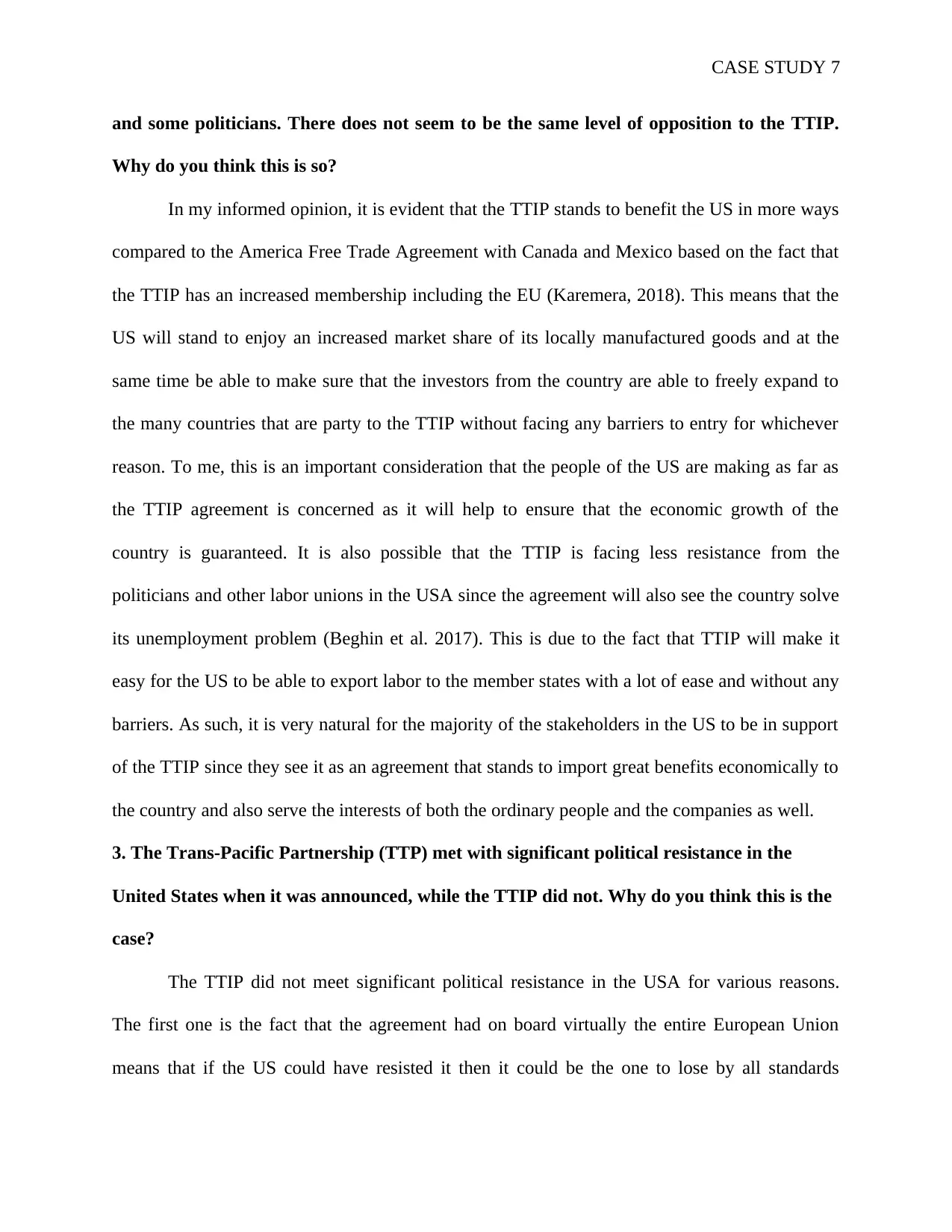
CASE STUDY 7
and some politicians. There does not seem to be the same level of opposition to the TTIP.
Why do you think this is so?
In my informed opinion, it is evident that the TTIP stands to benefit the US in more ways
compared to the America Free Trade Agreement with Canada and Mexico based on the fact that
the TTIP has an increased membership including the EU (Karemera, 2018). This means that the
US will stand to enjoy an increased market share of its locally manufactured goods and at the
same time be able to make sure that the investors from the country are able to freely expand to
the many countries that are party to the TTIP without facing any barriers to entry for whichever
reason. To me, this is an important consideration that the people of the US are making as far as
the TTIP agreement is concerned as it will help to ensure that the economic growth of the
country is guaranteed. It is also possible that the TTIP is facing less resistance from the
politicians and other labor unions in the USA since the agreement will also see the country solve
its unemployment problem (Beghin et al. 2017). This is due to the fact that TTIP will make it
easy for the US to be able to export labor to the member states with a lot of ease and without any
barriers. As such, it is very natural for the majority of the stakeholders in the US to be in support
of the TTIP since they see it as an agreement that stands to import great benefits economically to
the country and also serve the interests of both the ordinary people and the companies as well.
3. The Trans-Pacific Partnership (TTP) met with significant political resistance in the
United States when it was announced, while the TTIP did not. Why do you think this is the
case?
The TTIP did not meet significant political resistance in the USA for various reasons.
The first one is the fact that the agreement had on board virtually the entire European Union
means that if the US could have resisted it then it could be the one to lose by all standards
and some politicians. There does not seem to be the same level of opposition to the TTIP.
Why do you think this is so?
In my informed opinion, it is evident that the TTIP stands to benefit the US in more ways
compared to the America Free Trade Agreement with Canada and Mexico based on the fact that
the TTIP has an increased membership including the EU (Karemera, 2018). This means that the
US will stand to enjoy an increased market share of its locally manufactured goods and at the
same time be able to make sure that the investors from the country are able to freely expand to
the many countries that are party to the TTIP without facing any barriers to entry for whichever
reason. To me, this is an important consideration that the people of the US are making as far as
the TTIP agreement is concerned as it will help to ensure that the economic growth of the
country is guaranteed. It is also possible that the TTIP is facing less resistance from the
politicians and other labor unions in the USA since the agreement will also see the country solve
its unemployment problem (Beghin et al. 2017). This is due to the fact that TTIP will make it
easy for the US to be able to export labor to the member states with a lot of ease and without any
barriers. As such, it is very natural for the majority of the stakeholders in the US to be in support
of the TTIP since they see it as an agreement that stands to import great benefits economically to
the country and also serve the interests of both the ordinary people and the companies as well.
3. The Trans-Pacific Partnership (TTP) met with significant political resistance in the
United States when it was announced, while the TTIP did not. Why do you think this is the
case?
The TTIP did not meet significant political resistance in the USA for various reasons.
The first one is the fact that the agreement had on board virtually the entire European Union
means that if the US could have resisted it then it could be the one to lose by all standards
Paraphrase This Document
Need a fresh take? Get an instant paraphrase of this document with our AI Paraphraser
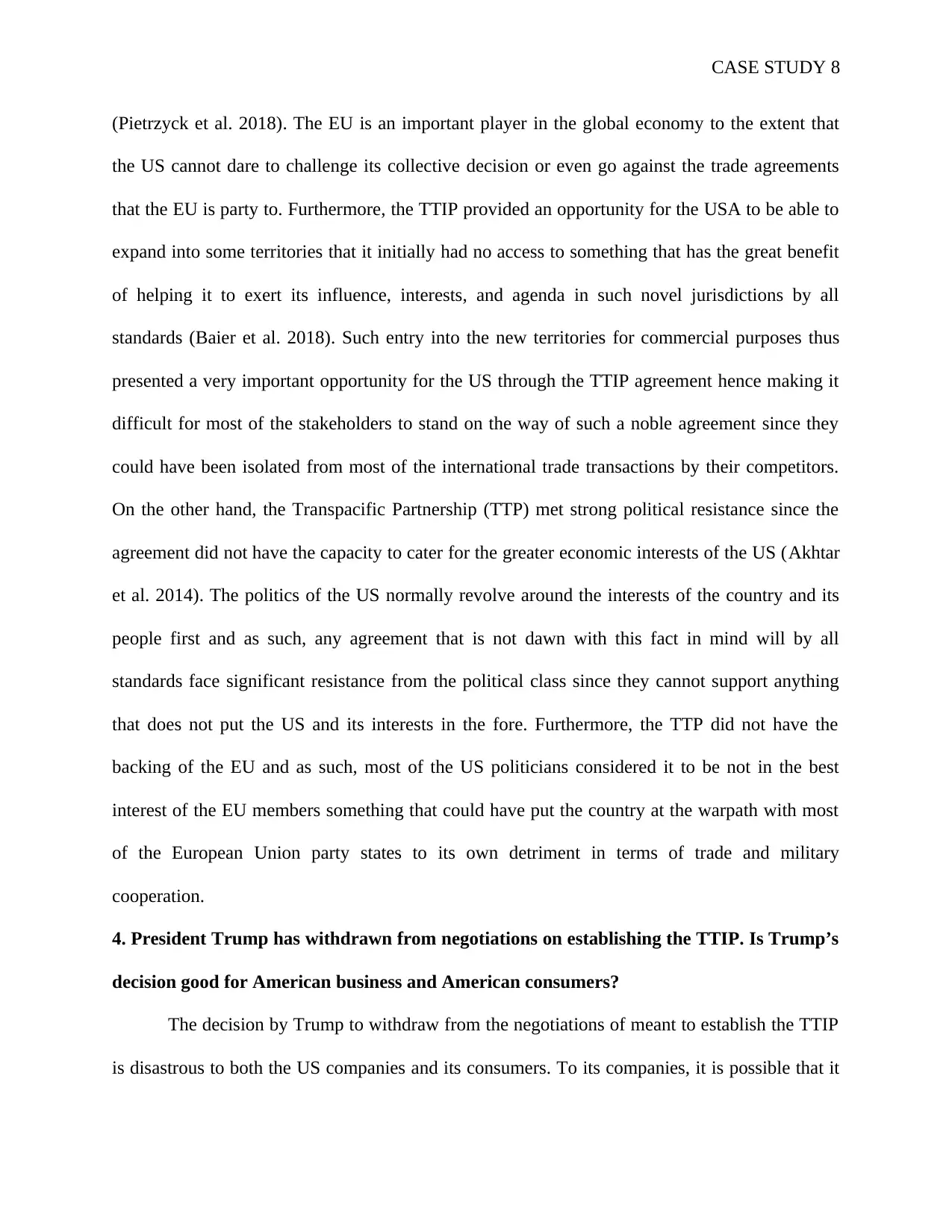
CASE STUDY 8
(Pietrzyck et al. 2018). The EU is an important player in the global economy to the extent that
the US cannot dare to challenge its collective decision or even go against the trade agreements
that the EU is party to. Furthermore, the TTIP provided an opportunity for the USA to be able to
expand into some territories that it initially had no access to something that has the great benefit
of helping it to exert its influence, interests, and agenda in such novel jurisdictions by all
standards (Baier et al. 2018). Such entry into the new territories for commercial purposes thus
presented a very important opportunity for the US through the TTIP agreement hence making it
difficult for most of the stakeholders to stand on the way of such a noble agreement since they
could have been isolated from most of the international trade transactions by their competitors.
On the other hand, the Transpacific Partnership (TTP) met strong political resistance since the
agreement did not have the capacity to cater for the greater economic interests of the US (Akhtar
et al. 2014). The politics of the US normally revolve around the interests of the country and its
people first and as such, any agreement that is not dawn with this fact in mind will by all
standards face significant resistance from the political class since they cannot support anything
that does not put the US and its interests in the fore. Furthermore, the TTP did not have the
backing of the EU and as such, most of the US politicians considered it to be not in the best
interest of the EU members something that could have put the country at the warpath with most
of the European Union party states to its own detriment in terms of trade and military
cooperation.
4. President Trump has withdrawn from negotiations on establishing the TTIP. Is Trump’s
decision good for American business and American consumers?
The decision by Trump to withdraw from the negotiations of meant to establish the TTIP
is disastrous to both the US companies and its consumers. To its companies, it is possible that it
(Pietrzyck et al. 2018). The EU is an important player in the global economy to the extent that
the US cannot dare to challenge its collective decision or even go against the trade agreements
that the EU is party to. Furthermore, the TTIP provided an opportunity for the USA to be able to
expand into some territories that it initially had no access to something that has the great benefit
of helping it to exert its influence, interests, and agenda in such novel jurisdictions by all
standards (Baier et al. 2018). Such entry into the new territories for commercial purposes thus
presented a very important opportunity for the US through the TTIP agreement hence making it
difficult for most of the stakeholders to stand on the way of such a noble agreement since they
could have been isolated from most of the international trade transactions by their competitors.
On the other hand, the Transpacific Partnership (TTP) met strong political resistance since the
agreement did not have the capacity to cater for the greater economic interests of the US (Akhtar
et al. 2014). The politics of the US normally revolve around the interests of the country and its
people first and as such, any agreement that is not dawn with this fact in mind will by all
standards face significant resistance from the political class since they cannot support anything
that does not put the US and its interests in the fore. Furthermore, the TTP did not have the
backing of the EU and as such, most of the US politicians considered it to be not in the best
interest of the EU members something that could have put the country at the warpath with most
of the European Union party states to its own detriment in terms of trade and military
cooperation.
4. President Trump has withdrawn from negotiations on establishing the TTIP. Is Trump’s
decision good for American business and American consumers?
The decision by Trump to withdraw from the negotiations of meant to establish the TTIP
is disastrous to both the US companies and its consumers. To its companies, it is possible that it
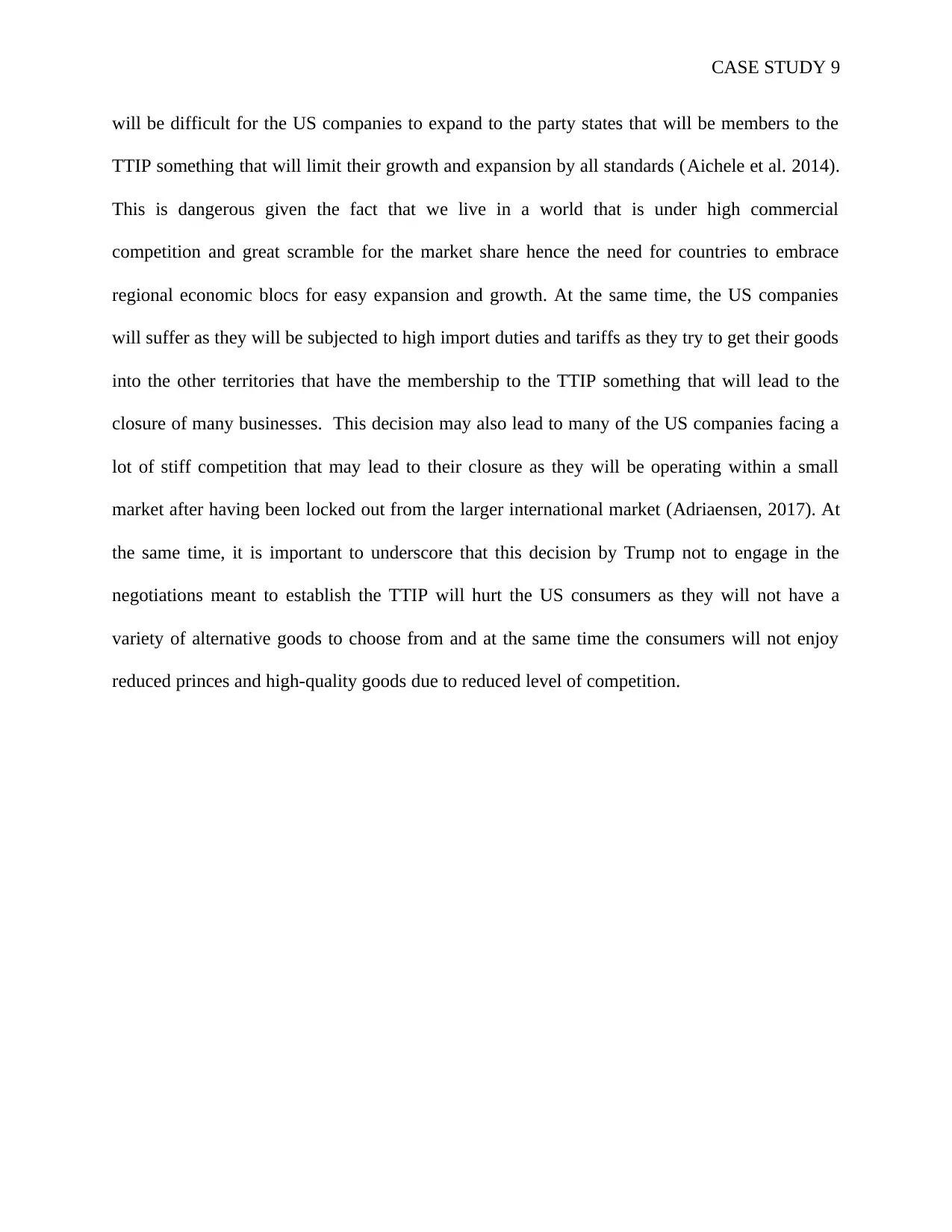
CASE STUDY 9
will be difficult for the US companies to expand to the party states that will be members to the
TTIP something that will limit their growth and expansion by all standards (Aichele et al. 2014).
This is dangerous given the fact that we live in a world that is under high commercial
competition and great scramble for the market share hence the need for countries to embrace
regional economic blocs for easy expansion and growth. At the same time, the US companies
will suffer as they will be subjected to high import duties and tariffs as they try to get their goods
into the other territories that have the membership to the TTIP something that will lead to the
closure of many businesses. This decision may also lead to many of the US companies facing a
lot of stiff competition that may lead to their closure as they will be operating within a small
market after having been locked out from the larger international market (Adriaensen, 2017). At
the same time, it is important to underscore that this decision by Trump not to engage in the
negotiations meant to establish the TTIP will hurt the US consumers as they will not have a
variety of alternative goods to choose from and at the same time the consumers will not enjoy
reduced princes and high-quality goods due to reduced level of competition.
will be difficult for the US companies to expand to the party states that will be members to the
TTIP something that will limit their growth and expansion by all standards (Aichele et al. 2014).
This is dangerous given the fact that we live in a world that is under high commercial
competition and great scramble for the market share hence the need for countries to embrace
regional economic blocs for easy expansion and growth. At the same time, the US companies
will suffer as they will be subjected to high import duties and tariffs as they try to get their goods
into the other territories that have the membership to the TTIP something that will lead to the
closure of many businesses. This decision may also lead to many of the US companies facing a
lot of stiff competition that may lead to their closure as they will be operating within a small
market after having been locked out from the larger international market (Adriaensen, 2017). At
the same time, it is important to underscore that this decision by Trump not to engage in the
negotiations meant to establish the TTIP will hurt the US consumers as they will not have a
variety of alternative goods to choose from and at the same time the consumers will not enjoy
reduced princes and high-quality goods due to reduced level of competition.
⊘ This is a preview!⊘
Do you want full access?
Subscribe today to unlock all pages.

Trusted by 1+ million students worldwide
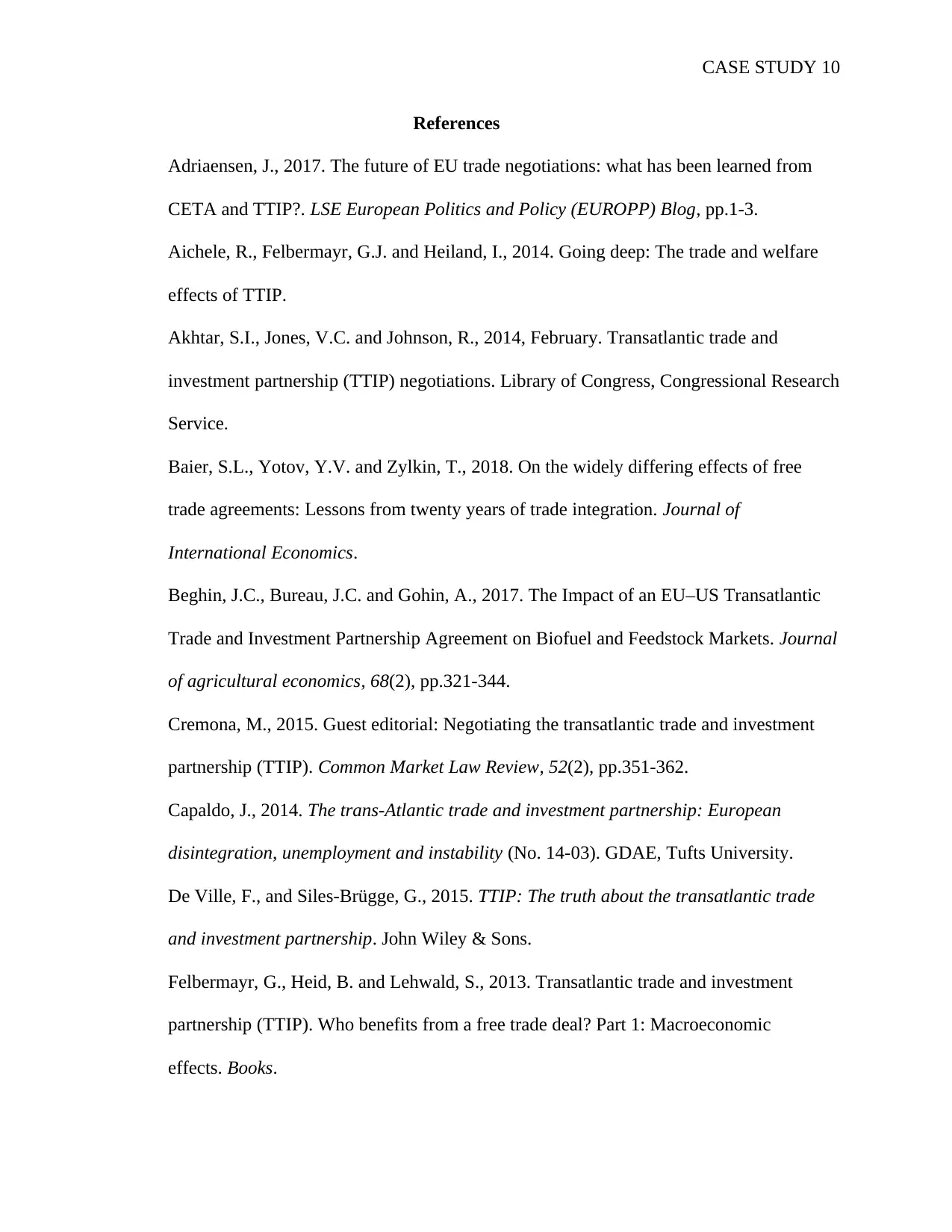
CASE STUDY 10
References
Adriaensen, J., 2017. The future of EU trade negotiations: what has been learned from
CETA and TTIP?. LSE European Politics and Policy (EUROPP) Blog, pp.1-3.
Aichele, R., Felbermayr, G.J. and Heiland, I., 2014. Going deep: The trade and welfare
effects of TTIP.
Akhtar, S.I., Jones, V.C. and Johnson, R., 2014, February. Transatlantic trade and
investment partnership (TTIP) negotiations. Library of Congress, Congressional Research
Service.
Baier, S.L., Yotov, Y.V. and Zylkin, T., 2018. On the widely differing effects of free
trade agreements: Lessons from twenty years of trade integration. Journal of
International Economics.
Beghin, J.C., Bureau, J.C. and Gohin, A., 2017. The Impact of an EU–US Transatlantic
Trade and Investment Partnership Agreement on Biofuel and Feedstock Markets. Journal
of agricultural economics, 68(2), pp.321-344.
Cremona, M., 2015. Guest editorial: Negotiating the transatlantic trade and investment
partnership (TTIP). Common Market Law Review, 52(2), pp.351-362.
Capaldo, J., 2014. The trans-Atlantic trade and investment partnership: European
disintegration, unemployment and instability (No. 14-03). GDAE, Tufts University.
De Ville, F., and Siles-Brügge, G., 2015. TTIP: The truth about the transatlantic trade
and investment partnership. John Wiley & Sons.
Felbermayr, G., Heid, B. and Lehwald, S., 2013. Transatlantic trade and investment
partnership (TTIP). Who benefits from a free trade deal? Part 1: Macroeconomic
effects. Books.
References
Adriaensen, J., 2017. The future of EU trade negotiations: what has been learned from
CETA and TTIP?. LSE European Politics and Policy (EUROPP) Blog, pp.1-3.
Aichele, R., Felbermayr, G.J. and Heiland, I., 2014. Going deep: The trade and welfare
effects of TTIP.
Akhtar, S.I., Jones, V.C. and Johnson, R., 2014, February. Transatlantic trade and
investment partnership (TTIP) negotiations. Library of Congress, Congressional Research
Service.
Baier, S.L., Yotov, Y.V. and Zylkin, T., 2018. On the widely differing effects of free
trade agreements: Lessons from twenty years of trade integration. Journal of
International Economics.
Beghin, J.C., Bureau, J.C. and Gohin, A., 2017. The Impact of an EU–US Transatlantic
Trade and Investment Partnership Agreement on Biofuel and Feedstock Markets. Journal
of agricultural economics, 68(2), pp.321-344.
Cremona, M., 2015. Guest editorial: Negotiating the transatlantic trade and investment
partnership (TTIP). Common Market Law Review, 52(2), pp.351-362.
Capaldo, J., 2014. The trans-Atlantic trade and investment partnership: European
disintegration, unemployment and instability (No. 14-03). GDAE, Tufts University.
De Ville, F., and Siles-Brügge, G., 2015. TTIP: The truth about the transatlantic trade
and investment partnership. John Wiley & Sons.
Felbermayr, G., Heid, B. and Lehwald, S., 2013. Transatlantic trade and investment
partnership (TTIP). Who benefits from a free trade deal? Part 1: Macroeconomic
effects. Books.
Paraphrase This Document
Need a fresh take? Get an instant paraphrase of this document with our AI Paraphraser
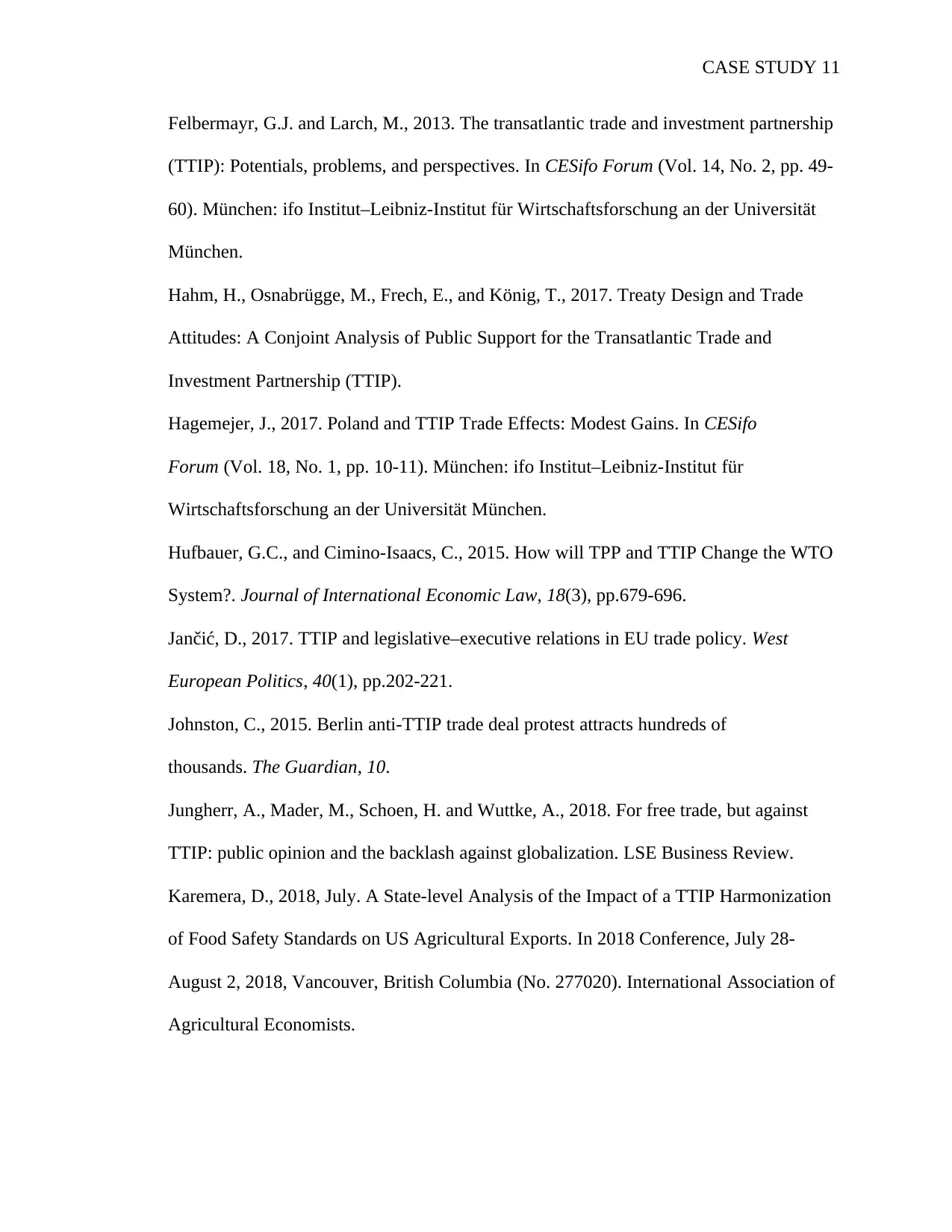
CASE STUDY 11
Felbermayr, G.J. and Larch, M., 2013. The transatlantic trade and investment partnership
(TTIP): Potentials, problems, and perspectives. In CESifo Forum (Vol. 14, No. 2, pp. 49-
60). München: ifo Institut–Leibniz-Institut für Wirtschaftsforschung an der Universität
München.
Hahm, H., Osnabrügge, M., Frech, E., and König, T., 2017. Treaty Design and Trade
Attitudes: A Conjoint Analysis of Public Support for the Transatlantic Trade and
Investment Partnership (TTIP).
Hagemejer, J., 2017. Poland and TTIP Trade Effects: Modest Gains. In CESifo
Forum (Vol. 18, No. 1, pp. 10-11). München: ifo Institut–Leibniz-Institut für
Wirtschaftsforschung an der Universität München.
Hufbauer, G.C., and Cimino-Isaacs, C., 2015. How will TPP and TTIP Change the WTO
System?. Journal of International Economic Law, 18(3), pp.679-696.
Jančić, D., 2017. TTIP and legislative‒executive relations in EU trade policy. West
European Politics, 40(1), pp.202-221.
Johnston, C., 2015. Berlin anti-TTIP trade deal protest attracts hundreds of
thousands. The Guardian, 10.
Jungherr, A., Mader, M., Schoen, H. and Wuttke, A., 2018. For free trade, but against
TTIP: public opinion and the backlash against globalization. LSE Business Review.
Karemera, D., 2018, July. A State-level Analysis of the Impact of a TTIP Harmonization
of Food Safety Standards on US Agricultural Exports. In 2018 Conference, July 28-
August 2, 2018, Vancouver, British Columbia (No. 277020). International Association of
Agricultural Economists.
Felbermayr, G.J. and Larch, M., 2013. The transatlantic trade and investment partnership
(TTIP): Potentials, problems, and perspectives. In CESifo Forum (Vol. 14, No. 2, pp. 49-
60). München: ifo Institut–Leibniz-Institut für Wirtschaftsforschung an der Universität
München.
Hahm, H., Osnabrügge, M., Frech, E., and König, T., 2017. Treaty Design and Trade
Attitudes: A Conjoint Analysis of Public Support for the Transatlantic Trade and
Investment Partnership (TTIP).
Hagemejer, J., 2017. Poland and TTIP Trade Effects: Modest Gains. In CESifo
Forum (Vol. 18, No. 1, pp. 10-11). München: ifo Institut–Leibniz-Institut für
Wirtschaftsforschung an der Universität München.
Hufbauer, G.C., and Cimino-Isaacs, C., 2015. How will TPP and TTIP Change the WTO
System?. Journal of International Economic Law, 18(3), pp.679-696.
Jančić, D., 2017. TTIP and legislative‒executive relations in EU trade policy. West
European Politics, 40(1), pp.202-221.
Johnston, C., 2015. Berlin anti-TTIP trade deal protest attracts hundreds of
thousands. The Guardian, 10.
Jungherr, A., Mader, M., Schoen, H. and Wuttke, A., 2018. For free trade, but against
TTIP: public opinion and the backlash against globalization. LSE Business Review.
Karemera, D., 2018, July. A State-level Analysis of the Impact of a TTIP Harmonization
of Food Safety Standards on US Agricultural Exports. In 2018 Conference, July 28-
August 2, 2018, Vancouver, British Columbia (No. 277020). International Association of
Agricultural Economists.
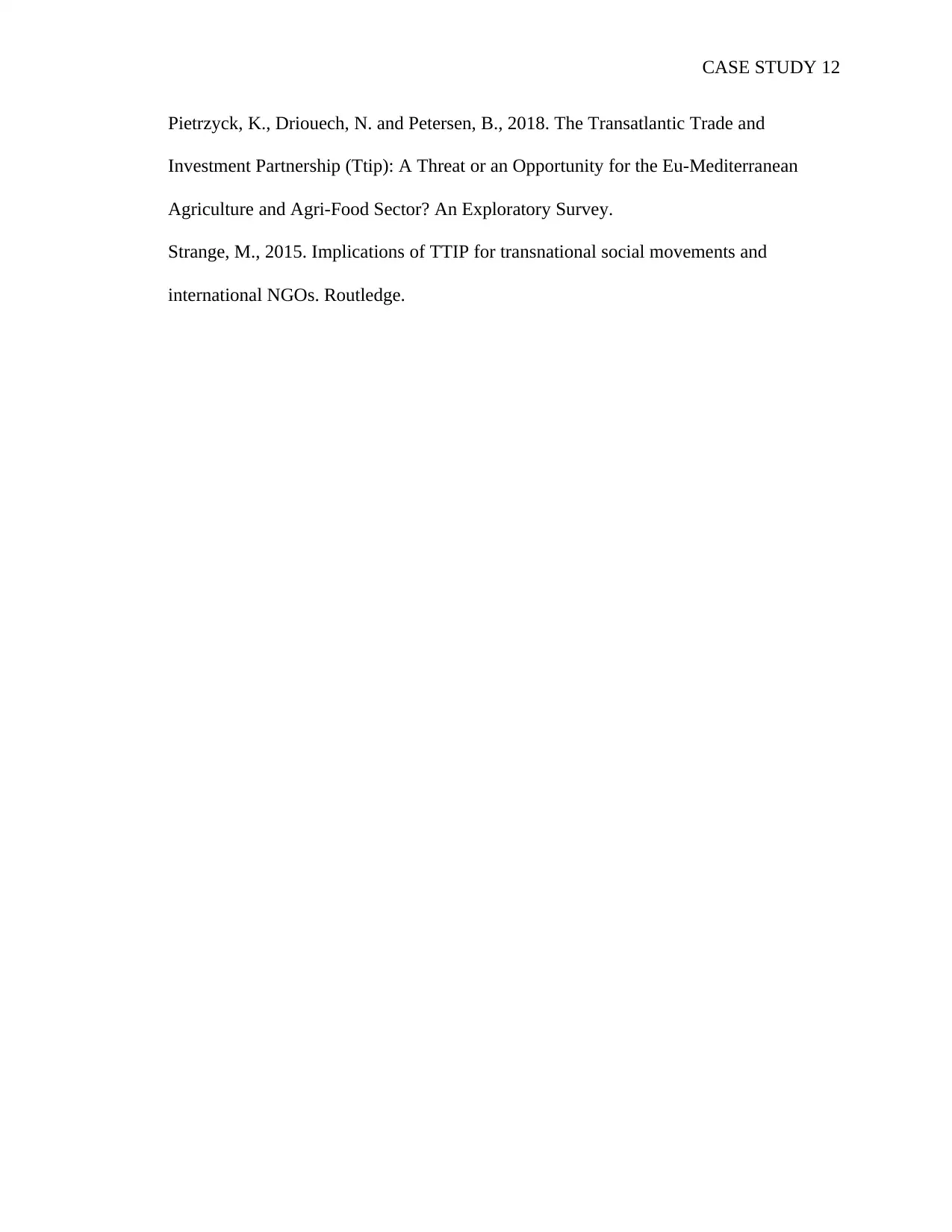
CASE STUDY 12
Pietrzyck, K., Driouech, N. and Petersen, B., 2018. The Transatlantic Trade and
Investment Partnership (Ttip): A Threat or an Opportunity for the Eu-Mediterranean
Agriculture and Agri-Food Sector? An Exploratory Survey.
Strange, M., 2015. Implications of TTIP for transnational social movements and
international NGOs. Routledge.
Pietrzyck, K., Driouech, N. and Petersen, B., 2018. The Transatlantic Trade and
Investment Partnership (Ttip): A Threat or an Opportunity for the Eu-Mediterranean
Agriculture and Agri-Food Sector? An Exploratory Survey.
Strange, M., 2015. Implications of TTIP for transnational social movements and
international NGOs. Routledge.
⊘ This is a preview!⊘
Do you want full access?
Subscribe today to unlock all pages.

Trusted by 1+ million students worldwide
1 out of 12
Related Documents
Your All-in-One AI-Powered Toolkit for Academic Success.
+13062052269
info@desklib.com
Available 24*7 on WhatsApp / Email
![[object Object]](/_next/static/media/star-bottom.7253800d.svg)
Unlock your academic potential
Copyright © 2020–2026 A2Z Services. All Rights Reserved. Developed and managed by ZUCOL.




